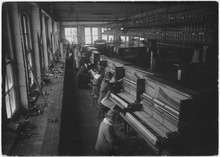Cable Piano Company
| Industry | Piano designing / manufacturing |
|---|---|
| Founded | 1880 |
| Founder | Herman D. Cable |
| Headquarters | Chicago, Illinois, The United States |
| Products | Pianos |

The Cable Piano Company or simply Cable Company was an American piano manufacturing company founded by Herman D. Cable in 1880. It was one of the largest piano makers in Chicago.[1] It claimed to be "the world's greatest manufacturer of pianos, inner player pianos, and organs".[2] In 1901, the company built a factory in St. Charles on 3.5 acres west of the Fox River.[3]
History
After being originally involved with the Western Cottage Organ Company (later changed to Chicago Cottage Organ Company), H.D. Cable founded The Cable Piano Company, and subsequently became one of the major contributors to the American piano industry.[4] In 1890, Cable consolidated with the Conover Brothers, as well as his two brothers Fayette S. Cable and Hobart M. Cable (although Fayette S. Cable and Hobart M. Cable continued to build pianos under their own names).[5] During the factory's heyday in the early 1900s, there were as many as 500 employees.[6]
Brands
The Cable Company produced pianos under different name brands, after acquiring other piano makers. In 1936, the Schiller Piano Company was acquired, producing pianos under the name Cable and Conover. Other piano brands that were acquired and/or produced by Cable were Euphona,[7] Kingsbury,[8] Wellington[9] and Elburn. The facility known as the Wellington Piano Case Company Building, is on the National Register of Historic Places in Leominster, Massachusetts.
Building
The factory was located in the city of Saint Charles, Illinois near the Fox River. Built in 1901, it manufactured pianos until 1936, when it was converted into a furniture factory for W.H. Howell. The factory would close in 1980 due to financial hardships. It would reopen six years later in 1986 as the Piano Factory Outlet Mall serving as an indoor mall with many outlet stores for major brands such as Corning, American Tourister, Carter's, Pfalzgraff and Anchor Hocking. The building would close due to foreclosure on the site and would be razed in 2000. Condominiums and other mixed use buildings occupy the site now.
References